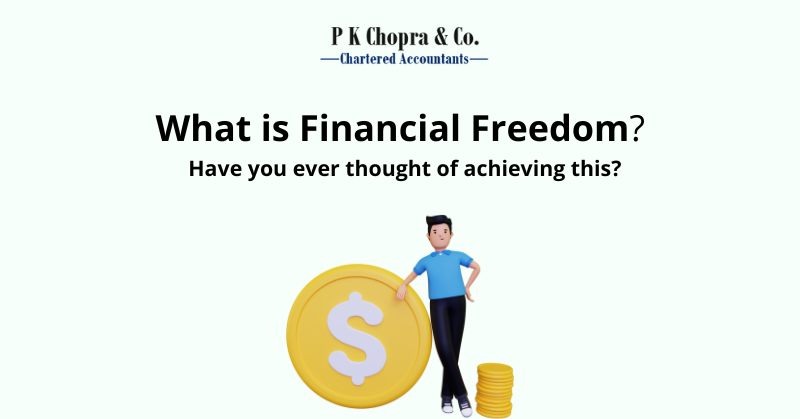What is Financial Freedom? Have you ever thought of achieving this?
“It’s not about the amount of money you make, it’s about the amount of money you have and how that money can benefit you, and the number of generations you have.”
The biggest mistake many of us make is to work hard for our entire life for money and not expect money to work for us in return.
As the behemoth of all the investors, Mr Warren Buffet says, “If you have only one source of income, you will work until you die.” This statement makes more sense during the covid period, wherein those who have only one source of income (mainly salary) struggle to meet their livelihood; on the other hand, those who have multiple sources (consisting of active as well as passive income) spent their lockdown in ease in comparison. Therefore, it is the requirement of the moment that every citizen of India should be aware of the significance of financial Literacy as well as Financial Freedom in their schooling. Although it’s never too late to know these things, the earlier, the better, so one can reap the benefits of the 8th wonder of the world, i.e. Compounding.
What is Financial Literacy?
Financial literacy is being able to not allow money – or the lack of it interfere with your comfort while working at your job and build your dreams, complete with a long and fulfilling retirement.
- Financial literacy is a mixture of essential financial abilities and concepts.
- People who are financially literate tend to be less susceptible to financial scams.
- A solid base of financial literacy can assist us in achieving various goals in our lives, like saving for retirement or education and utilizing debt in a responsible manner as well as running your company
What is Financial Freedom?
Financial freedom generally means that one has enough savings, investments, and money to live the life one wants to live for himself and his family, too, without relying on anyone. The best way to achieve financial freedom is by making a timely investment. As it has been rightly saying, “THE EARLIER YOU START YOUR RETIREMENT PLANNING, GREATER IS THE POTENTIAL RATE OF RETURN ON YOUR INVESTMENT.”
Invest your money on a Long Term Basis
An investment made for the long term is the best way to maximize the growth potential of your savings. Long-term investments can provide greater tax advantages on capital gains than investments made in short-term time. Furthermore, it also reduces the risk factor of market volatility. The most compelling reason to invest in a long-term time frame is the advantage of Compounding.50/30/20 RULE
The basic 50/30/20 rule can be easily mastered in real-life practice. As a rule, it suggests diversifying our income into three subsequent parts, 50% of our earnings should contribute to our needs and necessary expenses, 30% should satisfy our wants, and the remaining 20 % should be kept for savings and investment purposes. The basic 50/30/20 rule can be easily mastered in real-life practice. So, the 50/30/20 RULE helps limit overspending and promote healthy financial habits.
Should we Diversify our Savings?
It is one of the most common questions that most of us think should we finance all our savings in one investment tool or diversify? So, diversification is the most simplistic way to boost your returns and reduce the asset price movement risk. It’s among the most frequently asked questions. we all have. Should we put all of our savings with one investment tool or spread it across multiple investment tools?.
Examples of some investment options Available:
Public Provident Fund(PPF)
– Nowadays, PPF is considered one of the most popular saving schemes. PPF replenishes deductions up to 150000 under 80C of the Income Tax Act,1961. Additionally, the interest earned on the PPF scheme is also tax-free.. It is ideal for investors looking for stability and also high-returns.
Sukanya Samridhi Yojana
-Investment made in (SSY) can be utilized for girls’ child weddings and education. The above scheme provides deduction under section 80 C of the Income Tax Act. The interest rate is also relatively high compared to other small saving schemes.
Fixed Deposit
– It is the best-suited investment plan for those unwilling to bear risk. As opposed to other investment tools FDs aren’t influenced by the market. Like PPFs, they, too, attract tax benefits under 80C of the Income Tax Act 1961 As with PPFs like PPFs, they also, enjoy tax benefits under section 80C in the Revenue Tax Act 1961. In the event of a dire financial need, we may get loans against FD instead of breaking it or incurring immediately penalized. When you invest in FD for a longer tenure, the principal fundamental value compounds over time and helps you earn a better interest rate.
Let’s Conclude-
Financial literacy is vital to eliminating financial blunders for a robust, safe and secure future. Therefore, don’t view savings as punishment. Instead, invest your money in a wise manner and at the proper moment.. Being financially literate will help you make better financial decisions and cause less financial stress and anxiety. So, your stress-free future depends on the financial decision you make today; each of us needs to understand the essence of being financially literate.

